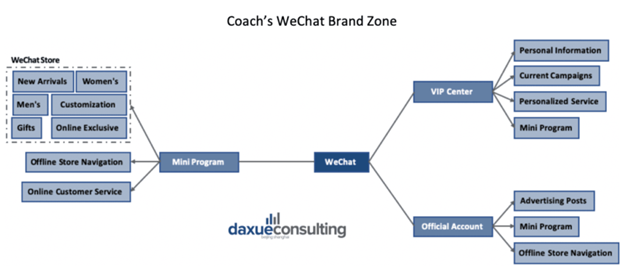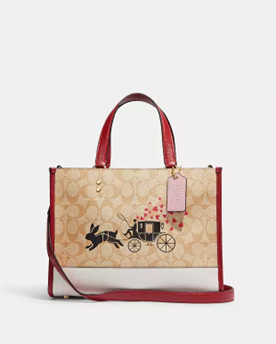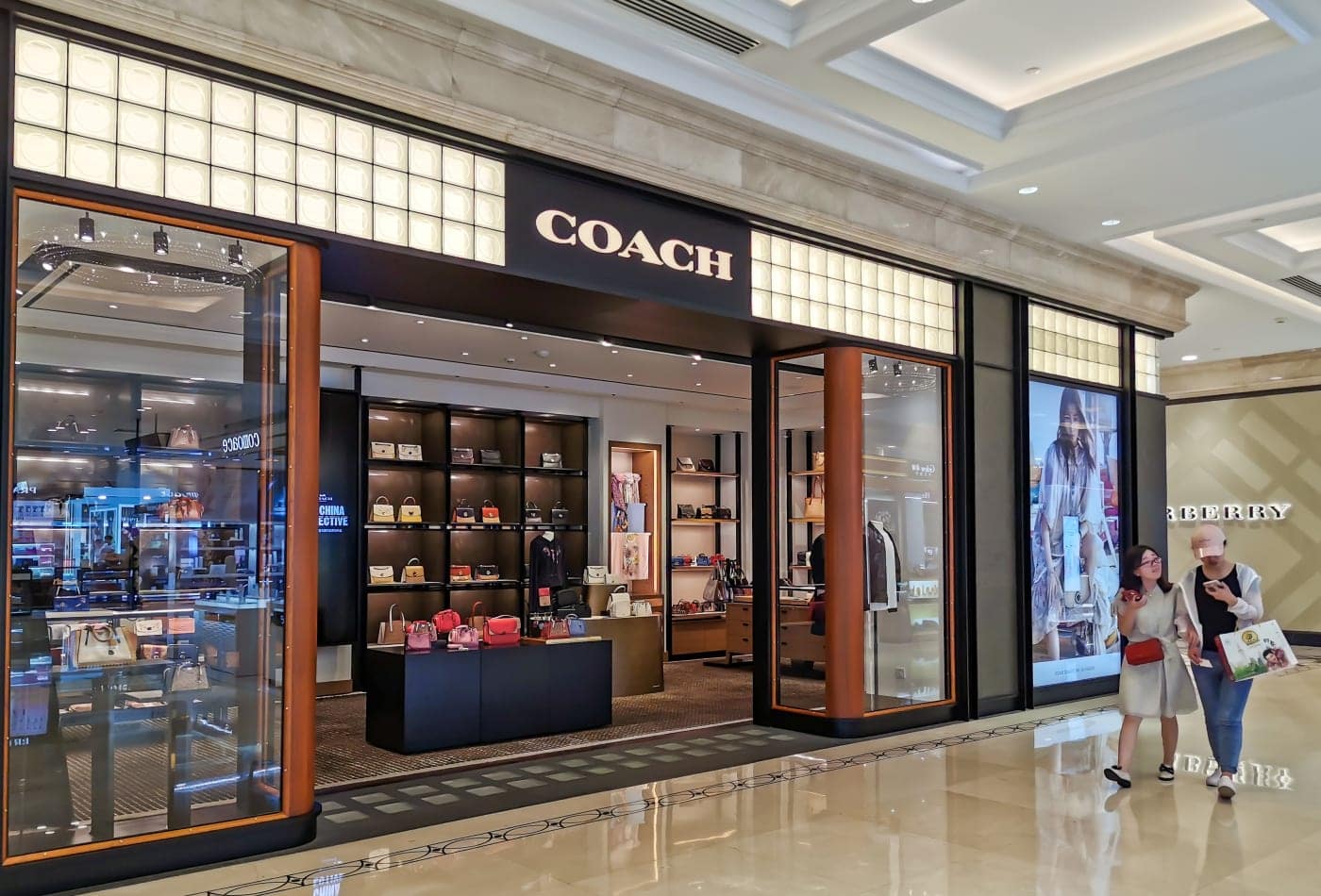Coach’s journey from a small New York leather workshop in 1941 to a global affordable luxury brand exemplifies the rise of accessible luxury. With annual sales of around $5.1 billion, Coach has built a strong presence worldwide, including a fast-growing market in China. Coach in China has become one of the brand’s key success stories in recent years.
China has become an essential market for Coach
Coach entered mainland China in 2008, starting with only about $50 million in annual sales. After the 2008 financial crisis, global luxury brands became increasingly reliant on China’s burgeoning middle class for growth. Today, Coach has around 280 stores in China and continues to expand, with plans for over 300 locations by 2025.
Coach’s Marketing Strategy in China
Although Coach is regarded as an affordable luxury brand targeting the middle class in North America and Europe, the price of Coach in China is notably higher. The price difference between Coach’s products in China and in the U.S. has historically been over 40%, which has pushed many Chinese consumers to purchase Coach goods abroad.
Global Marketing Strategy: A Concept of Modern Luxury
Starting in 2015, Coach evolved its global marketing strategy to maintain a leading position and reduce brand dilution, especially amid competition with rival Michael Kors. In 2015 and 2017, Coach acquired luxury shoe brand Stuart Weitzman and affordable luxury brand Kate Spade, respectively, transforming Coach’s parent company into the multi-brand Tapestry, Inc.. In June 2013, British designer Stuart Vevers joined Coach as Executive Creative Director. By February 2014, Vevers debuted Coach’s first-ever ready-to-wear collection at New York Fashion Week. The chic designs, combining functionality with youthful style, were praised by critics and helped reposition Coach as more of a true luxury fashion brand. Coach also worked to distinguish its full-price line from its outlet line: handbags and accessories in full-price stores adopted subtle, logo-free designs, while outlet products continued to feature the iconic “C” logos. This strategy helped Coach maintain its status among China’s middle class by offering aspirational designs without overexposure of the logo.
Cooperating with Chinese Celebrities
In recent years, luxury brands like Dior, Gucci, and Tod’s have deepened cooperation with Chinese celebrities, signaling respect for Chinese consumers’ tastes. Coach in China has applied similar strategies, leveraging popular local stars to build an intimate consumer-brand relationship. For example, in August 2020 Coach announced actress Yang Zi as its new ambassador for women’s products; the news amassed over 700,000 re-posts on Weibo within 6 hours, reflecting her enormous fan influence. In late 2024, Chinese actress Gulnazar (Nazha) was appointed as a global spokesperson for Coach, starring in the brand’s Spring 2025 campaign alongside Hollywood names. Collaborating with such young idols and actors has proven to be an effective marketing strategy in China.

Coach’s Collaboration with Tmall: A Road Full of Frustrations and Taboos
China is a country with an advanced digital ecosystem, where online shopping plays a huge role. In 2018, 42% of global e-commerce transactions took place in China. Consequently, more luxury brands have launched e-commerce offerings to boost sales in China. Coach was actually one of the pioneers: in late 2011, Coach and Alibaba collaborated to open an official Coach store on Tmall. At the time, Coach was the first global luxury brand on Tmall, a meaningful milestone for both sides (Tmall sought to shed its cheap image, and Coach gained early online exposure). Unfortunately, this initial partnership lasted only two months. Although Coach later explained that the short run was per a contract, it was widely believed that Coach pulled out due to frustration with Taobao’s persistent counterfeits on the platform.

After withdrawing, Coach stayed off third-party marketplaces for several years, focusing instead on its own online channels. This strategy of not selling on big e-commerce sites is known as “brand independence”, and brands like Louis Vuitton in China have famously employed it as well. Coach tried a second Tmall foray in 2015, but again exited after a year, stating it would concentrate on its own China e-commerce (in particular, building an online store on WeChat). For a while, Coach China’s approach prioritized directing consumers to its self-managed platforms, maintaining tighter control over brand image and customer data.
Coach’s WeChat Brand Zone
Coach opened its WeChat mini-program store in 2016, and WeChat remains a cornerstone of its China strategy. Coach’s WeChat Brand Zone integrates sales, promotions, and customer management in one place. By following Coach’s official WeChat account, consumers can manage their profile (including membership rewards and coupons), unlock exclusive offers, and access personalized services in a VIP Center The WeChat Official Account keeps followers updated on promotions, new collections, and product recommendations, often linking directly to the mini-program store for seamless shopping. The mini-program not only sells products but also provides a store locator and online customer service, bridging online and offline experiences.
WeChat’s versatility has enabled Coach to build a loyalty ecosystem in China. Members can use the app to track their purchase history, receive birthday perks, and even book in-store appointments. During major campaigns, Coach uses WeChat to drop exclusive content and limited-edition items, driving viral engagement. The brand’s digital-first approach has paid off – by spring 2021, Coach led many competitors in WeChat search interest, with its visibility on WeChat rising significantly. WeChat is not just a sales channel but a CRM platform for Coach China, nurturing long-term relationships with high-value customers.

Fashion Controversy in China: How Coach was involved
Brands operating in China must be vigilant about cultural and political sensitivities to avoid controversy. Coach learned this in August 2019, when it faced backlash for a T-shirt design listing Hong Kong and Taiwan as separate countries, perceived as a violation of China’s sovereignty. The incident sparked public outrage; Chinese social media was flooded with calls to boycott Coach’s parent company, Tapestry. The timing was especially painful as Coach had just appointed Liu Wen as an ambassador. Liu immediately terminated her contract to distance herself from the brand. Coach swiftly issued a public apology on Weibo and pulled the offending shirts worldwide, but the damage to its image among Chinese consumers was done.
In response, Coach has made concerted efforts in recent years to reinforce a positive brand image and resonate with Chinese culture. Every year, Coach rolls out special Lunar New Year collections and festive marketing in China. For instance, the Year of the Tiger 2022 saw Coach launch a nationwide “Red Room” campaign. This concept involved a Lunar New Year–themed makeover of 19 Coach stores across China, complete with immersive 3D art installations and vibrant red decor to honor the holiday. The Red Room campaign (spanning high-end malls to outlet stores) was one of Coach’s most extensive Chinese New Year activations and successfully blended traditional symbolism with the brand’s playful style. More recently, for Year of the Rabbit 2023, Coach introduced limited-edition accessories featuring cartoon bunny motifs and organized pop-up events where customers could send digital red envelopes. These annual Lunar New Year initiatives demonstrate Coach’s commitment to celebrating Chinese culture and have been generally well-received, helping the brand mend and strengthen its emotional connection with local consumers.

What brands can learn from Coach in China:
- Innovate with digital-first strategies – Experiment with livestreaming, social commerce, and metaverse activations to stay ahead of China’s fast-evolving digital ecosystem.st contact our project team at dx@daxueconsulting.com
- Invest in China’s long-term growth – Prioritize store expansion and duty-free channels like Hainan to capture the domestic tourism boom.
- Balance brand independence with reach – Use owned channels (WeChat, mini-programs) to protect brand image, while selectively partnering with platforms like Tmall Luxury Pavilion and Douyin for scale.
- Leverage local celebrity culture – Collaborate with Chinese idols and actors who resonate with Gen Z to build cultural relevance and amplify campaigns on social media.
- Localize cultural engagement – Create exclusive Lunar New Year collections, sustainability-driven sub-brands, and experiential pop-ups to show respect for Chinese values and trends.





